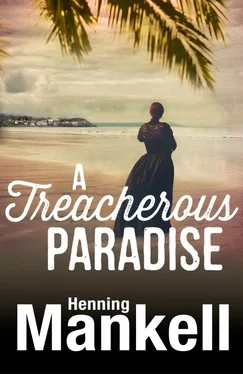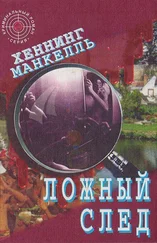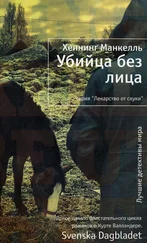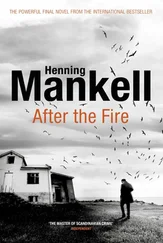On the way back she made a detour via the harbour. When O’Neill wondered why, she snapped at him. She didn’t like him asking questions all the time. She had begun to discover sides of O’Neill she didn’t like. She was annoyed by the way he eavesdropped on her, and, moreover, she had heard that he’d been seen in the company of the owner of another of the town’s brothels. Perhaps she had made a mistake in employing him?
‘What does she do all day?’ he asked. ‘Does she regret her sins? Does she hammer on the cell walls as if they were tom-tom drums? Does she turn up the whites of her eyes?’
Ana stopped dead.
‘One more word from you and you can go away and never come back.’
‘But I’m only asking a few questions.’
‘Not a word. Not a single word. From now on part of your duties is to remain silent.’
O’Neill shrugged, but Ana could see that he had understood the risk he was running.
When they came to the harbour Ana noticed that one of the English ships had left. She suspected that must be the ship that Halvorsen had signed on to as a carpenter.
She had also noted that O’Neill was staring hard at her. When she left the harbour she told him to stay where he was until she had disappeared round the first corner.
A few days later Pandre sent a telegram to say that he was on his way. Ana met him at the newly built railway station. Although Pandre had said in his telegram that he only intended to stay for two days, he had a large number of suitcases, bags and hat boxes with him. Four porters and two trolleys were needed to transport the luggage to the car that she had once again borrowed from Andrade. A horse-drawn carriage was filled with all the luggage for which there was no room in the boot of the car.
They drove to the hotel where, in accordance with the instructions in Pandre’s telegram, Ana had rented the largest suite they had. Ana had been a little worried when she went to the hotel: would they accept Pandre, who was coloured, as a guest? But the hotel manager had assured her that a lawyer of Indian origin would be most welcome. Ana was committed to paying all expenses for Pandre’s visit, and handed over a sum of money to pay for his stay. She began to wonder if Pandre was intentionally doing all he could to squeeze out of her as much money as possible; or was this the way he always lived whenever he left Johannesburg on business?
After Pandre had taken a bath, changed into a newly ironed white linen suit and then spent some time admiring the view, they sat down to eat in the empty dining room.
Dark clouds were gathering over the inland mountains, presaging a storm that would arrive in Lourenço Marques by the evening. Ana told Pandre about her conversation with the new prison governor, and explained that Pandre would only be allowed in if he played the role of a doctor.
‘I don’t have a white coat with me in my luggage, I’m afraid,’ he said. ‘Being a lawyer doesn’t normally mean that one needs to adopt a disguise.’
‘I don’t think that will be necessary, either.’
‘Tell me more about this man. Officers in the military are often suspicious by their very nature. Will he be able to see through a false doctor?’
‘I don’t know. He introduced himself as Lemuel Gulliver Sullivan. But he spoke fluent Portuguese so I suspect he’s only an Englishman by name.’
Pandre burst out laughing as he rolled a gleaming serviette ring between his fingers.
‘Is that really his name? Lemuel Gulliver Sullivan?’
‘I wrote the name down the moment I got back home.’
‘Was he surrounded by horses?’
‘The soldiers’ horses are stabled in the outskirts of the town. There are only a few goats inside the fort.’
‘I mean his soldiers. Did they look like horses?’
Ana didn’t understand his question. She was immediately on her guard.
‘Why should he be surrounded by horses?’
‘Yes, that’s a good question. Perhaps he was surrounded by unusually small people instead? People who would be able to stand inside this serviette ring as if it were a wine barrel. Or are his soldiers giants?’
He could see that she didn’t understand his references.
‘Lemuel Gulliver is a character in a novel,’ he said with a smile. ‘I’ve never heard of anybody cheeky or conceited enough to call their son after that remarkable fictional character. I take it you don’t know about the books featuring that man?’
‘I run a brothel,’ said Ana. ‘I’m trying to help a woman to get out of prison. I don’t read books.’
‘That sounds reasonable enough,’ said Pandre. ‘I don’t suppose that young commanding officer reads all that many books either. If any at all. But in any case, his father must have read Gulliver’s Travels .’
They ate in silence. Pandre occasionally asked her a question, mainly as a polite indication that he hadn’t retired entirely into his own private thoughts. He asked about the climate, the rainy season, animal life and various tropical illnesses. She answered as best she could, and wondered if he intended to visit her brothel that same evening, to take advantage of the special offer he had asked for and received.
But that wasn’t his plan. After the meal he stood up, bowed and asked to be collected at ten o’clock the following morning. Then he bowed again and left the dining room. Ana paid the bill, and was driven home.
Carlos had come down from the ceiling, replete with all the grasshoppers he had been gobbling. He was lying on her bed, belching contentedly. Ana sat down at her desk, opened her diary, but left it untouched to start with. She thought about the impression that Pandre had made, now that she had spent some time with him, and only then wrote down everything that had happened since he arrived.
One of these days she hoped to be able to read aloud for Isabel everything she had written. The story of the long journey she had undertaken in order to secure Isabel’s liberty.
She knew now how she would conclude her diary: she would note down the date and time when Isabel had been set free.
And she would also write the answer to the question she spent most of her time thinking about: was everything that had happened since the death of Lundmark merely a temporary parenthesis in her life?
The last thing she would write would be about Isabel’s and her own freedom.
She closed the diary, extinguished the paraffin lamp and remained sitting there in the dark. She thought: Isabel is locked up in her disgusting dump. And I’m confined in a different sort of prison.
The following day: intense heat.
Pearls of sweat were glinting on Pandre’s brow when he came out of his hotel and stepped into the car. He was carrying a leather briefcase. It occurred to Ana that it could very well have contained a stethoscope and other instruments that a doctor would need.
Lemuel Gulliver Sullivan was waiting for them on the steps, just as his sick predecessor had always done. Ana thought he looked like a little boy in a uniform that was too big for him and boots that were far too shiny.
She introduced Pandre.
‘Here is the doctor I spoke about with your predecessor — I assume he told you Herr Pandre would be coming?
The commanding officer nodded, but he regarded Pandre with undisguised antipathy.
‘I thought I had better come with you,’ he said, ‘and listen to the doctor’s conversation with his imprisoned patient.’
‘The conversation will take place in the patient’s own language,’ said Pandre in a friendly tone of voice. ‘That is purely in order that she can describe her aches and pains properly, so that I can ask the right questions and give answers that are clear to her.’
Читать дальше












